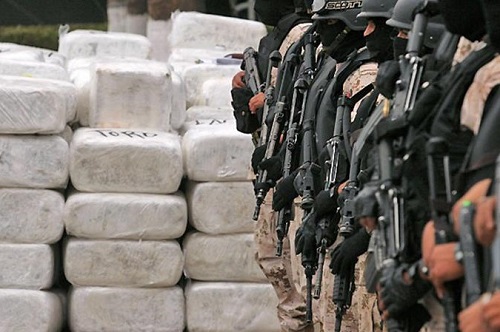Reuters photo
By
Ricardo Swire
In the War on Drugs America’s Kingpin Act was introduced to restrict foreign traffickers, their associates and related businesses from accessing the US financial system and restrict commercial trading with American businesses and nationals. Congress modelled regulations stipulate the President can determine whether or not a foreign drugs trafficker poses a threat to US national security, foreign policy or economy.
Following successful US Department of Treasury’s Office of Foreign Assets Control’s (OFAC) sanctions against Colombian drug cartels the Kingpin Act was revised, as part of Executive Order 12978 issued in October 1995, by the International Emergency Economic Powers Act (IEEPA). Kingpin Act invocation cancels the designee’s visa and freezes their assets under US jurisdiction. During the past seventeen years the Foreign Narcotics Kingpin Act targeted more than one thousand seven hundred companies and persons for involvement with international drug trafficking.
Caribbean internal security intelligence analysts acknowledged August 9, 2017 US Drug Enforcement Administration (DEA) publication of its biggest Mexican Kingpin designation to date. The most noteworthy elect was drugs baron “El Tio,” who was monitored by the US Treasury Department’s Office of Foreign Assets Control. The sixty-five year old middle level trafficker was previously a phantom with no public profile. Senior Mexican officials called him “the boss we least know.” The government, in unison with American counterparts, seized El Tio’s assets that include the Grand Casino in Guadalajara.
Since 1983 he enjoyed strategic relationships with the Sinaloa Cartel and Cartel de Jalisco Nueva Generacion (CJNG) bosses in Guadalajara, Jalisco and Mexico City. The Kingpin served as “financial operator” and managed transportation of cocaine shipments to America for both Cartels. He laundered CJNG’s cash and provided them with information on the Sinaloa Cartel’s infrastructure. For ten years Mexican Federal Police targeted El Tio “for organized crime, operations with resources of illicit origin, possession of guns and ammunition reserved for exclusive use by the Army, Navy and Air Force.”
The Mexican Kingpin also features on America’s wanted list for drugs trafficking and money laundering. Both El Tio and his Flores Cartel’s invisibility heavily depended on delegation of illegal assets among family and special colleagues. “Testaferros” included a singer, a Nortenos band leader and a footballer. These proxies laundered cash and kept assets on the Kingpin’s behalf. One co-conspirator was a football star who represented Mexico in four World Cups. He also played for European club teams Barcelona and Monaco.
Reports also linked El Tio’s invisible tentacles to Queretaro and Irapuato football teams, in addition to amateur teams Club Deportivo Morumbí and Club Deportivo Guerreros de Autlán. Caribbean internal security intelligence analysts noted a distinct trend of Mexican sports icons and entertainment celebrities as associates of the domestic underworld. A popular Mexican female singer, who died in a 2012 plane crash, often performed at Beltran Leyva Organization (BLO) Cartel parties. Mexican Federal Police also probed a local celebrity actress’ relationship with “El Chapo,” former boss of the Sinaloa Federation.
Ricardo Swire
Ricardo Swire is the Principal Consultant at R-L-H Security Consultants & Business Support Services and writes on a number of important issues.



No Comments Yet!
You can be first to comment this post!